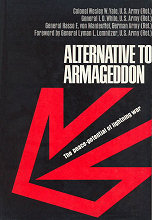
YALE – WHITE – MANTEUFFEL : Alternative to Armageddon (fülszöveg)
This book grows out of the conviction that the greatest immorality of any war is its unnecessary prolongation or amplification. It cites the obvious fact that the concept of the nuclear deterrent is no longer an effective instrument for peace in today's world, since the nuclear powers of the Western World at least have renounced the use of atomic weaponry. Further, it characterizes the Vietnam war as a conflict which leads to the hopeless strategy of attrition.
The use of lightning-war techniques—quick to strike, swift to contain and to resolve—would result in many fewer lives lost. The brevity and compression of such warfare would mean less spiritual as well as physical destruction.
The authors plead for reassessment of any military defense posture; they define the mechanisms and the philosophy of a practicable substitute for the total disaster of nuclear war or the agony of inconclusive use of military force. The reader is invited to think beyond catchwords.
Here also is a book that contains much exciting and revelatory reading in the sections of the book devoted to the history of lightning war as a military technique. The antecedents of the modern blitz are to be found in the military practices of the Persians and Assyrians and in the strategies and tactics of Alexander, Hannibal, and Genghis Khan. Nineteenth and twentieth century military leaders are cited in considerable depth, and include Napoleon, Nathan Bedford Forrest, Rommel, Patton, Ernest Harmon, and the Israeli commanders in the Six Day War.
The authors trace the genesis and development of the modern lightning-war strike force. They emphasize that such a force constitutes a truly effective deterrent to military aggression. While a high level of professional training is required, such a force also constitutes the smallest-sized practicable army with minimal manpower drains upon the supporting society. A capacity for this kind of lightning war is seen as a tool of national defense and not as an instrument of aggression.
Command and combat situations, both historical and hypothetical, are brilliantly used to illustrate the conviction of the authors that a change in emphasis and nature in the training for military leadership is required. Limited opportunity for experience in the higher command echelons suggests the use of simulators. These devices would produce battle situations and present imponderables, creating the pressure environment encountered in blitztype operations.
Finally, the authors feel strongly that lightning-war military reaction, to be successful, should be resorted to only when grave national interests are at stake and are fully understood and supported by the great mass of the people.